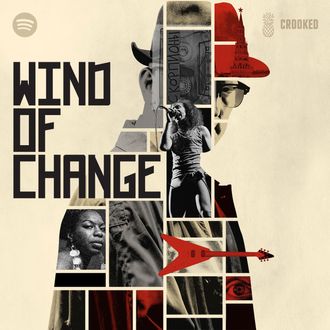
The elevator pitch is exquisite: What if I told you that “Wind of Change,” the sorta corny but kinda great 1990 power ballad from Scorpions, the German rock band best known for “Rock You Like a Hurricane,” might have actually been written by the CIA? And furthermore, that the song, which upon its release became a kind of anthem for peaceful revolution across Europe, was possibly a successful entry in a broader underground campaign by the West to expand its soft power against the Soviet Union during the Cold War?
That’s the mystery driving the new eight-part podcast series Wind of Change, which comes from a stacked partnership between Pineapple Street, Crooked Media, and Spotify. Led by New Yorker staff writer Patrick Radden Keefe and produced by Pineapple Street’s Henry Molofsky (who worked on Dan Taberski’s Missing Richard Simmons), the story, we’re told, begins with a tip provided years ago from a source that Keefe has long trusted in matters of covert affairs. It’s an idea that’s stuck with him ever since, burrowed into the back of his brain like an earworm.
The result of his hunch? A rambling voyage of a podcast that leads Keefe down a labyrinth of rabbit holes as he susses out different leads that may bring them closer to the truth. Egged on by the source, Keefe’s quest brings him into contact with former spies, aging members of the music world, and Scorpions-loving citizens of the former Soviet Union. The journey takes us to a shape-shifting Wonderland, a world where an American agency like the CIA may very well have participated in the production of pop culture as part of concerted efforts to build sentiment against its enemies abroad. It might even be something that’s happening right now.
The podcast takes its time to unfurl the investigation across its eight episodes. Each entry typically starts with a lead that centers around a different aspect of the mystery — what did the band’s manager know? Was the 1989 Moscow Music Peace Festival a front in all this? Who else might have known? — before sprawling out to introduce listeners to different layers of the broader political and cultural context. It jumps back and forth in time, giving you a feel for how shadowy and amorphous this aspect of the Cold War was, all of which amounts to the continuous building of the sense that, hey, maybe this whole CIA songwriting thing is possible, perhaps even probable.
But the idea of a CIA that makes movies or drop beats shouldn’t be that much of a mind-bending idea, really. After all, we all know now about the agency’s secret operation that involved faking a Hollywood production to extract diplomats during the Iran hostage crisis, the story of which was adapted into a 2012 Ben Affleck thriller that won the Oscar for Best Picture. (That film, Argo, is evoked several times in the podcast.) Besides, we live in a world that’s already rich with stuff like Michael Bay movies, Jack Bauer, and Zero Dark Thirty (also referenced in Wind of Change) — all pop culture products that, directly and indirectly, have the effects of (to put it mildly) projecting American objectives abroad, in addition to being pieces of generally successful mass entertainment. Indeed, it almost feels like it’s beside the point if an American agency actually participated in their creation.
But the notion is played up quite a bit across Wind of Change, sometimes almost naïvely. “Listen to a song, go to a movie, turn on the TV. You don’t think you’re on the receiving end of messaging — carefully devised and calibrated messaging,” Keefe narrates at one point. “And even if we do know in some conscious way, it’s easier, maybe, to put it out of mind. I mean, Argo was a good movie. Kinda takes the fun out of it to think that the person who set the whole thing in motion might be CIA director George Tenet.” Yes, your entertainment might have ulterior motives.
Still, the series is a really enjoyable listen. Probably one of the better audio documentaries that’s come out this year so far. It’s fun, it’s globe-trotting (a distinct pleasure during life under lockdown), and it’s especially appealing if you, like me, are the sort of person who’s already drawn to spy stories. You’ve got juicy talk of spycraft, subterfuge, international intrigue, and mysterious dinner parties — classic le Carré shit. You’ve got shady characters who may not be who they say they are, and historical events that took place that may not be what they seem. Hell, you even get a bit of drug-running on the side, just as a treat. All these pieces are bound together within an overarching framework of the Cold War–era global ideological struggle … which is appealing up until the point you remember that the conflict has been reprised in a new form today, and that the Americans seem to be on the losing side.
When the vibe propelling Wind of Change forward gets good, it gets really good. Keefe genuinely enjoys the muck of the mind game, the “who’s playing who?” of it all. A good deal of the show’s warped pleasures lie in always being aware that you can’t quite trust anything, that you’re hovering between a sense that nothing is real and a sense that everything is possible. There are quite a few denizens of the shadow world that pop up for interviews on this podcast, and as they present their perspectives, neither you nor Keefe can ever really shake the feeling you’re being strung along, or at least are given small pieces of a larger truth. Somewhere during the back half of the series, someone brings up the idea of a “useful idiot,” a person who was unintentionally utilized into carrying out propaganda without fully knowing it. Suddenly, the spirit of the search curdles. Is this a podcast that’s trying to find out whether the CIA wrote a hit song, or is this a podcast that someone’s trying to weaponize to make the CIA look more effective than it was? So on and so on, as what was once a rabbit hole turns into an Escher staircase.
But it is in the considerations of What It All Means where Wind of Change becomes somewhat unsatisfying, even a little hollow. Traipsing through Wonderland is fun and all, but the podcast’s journey can become so meandering at times — and in some ways, so pleased with its own curiosity — that I just can’t help thinking, “Okay, but what of it?”
Part of this, maybe, has to do with our current world, marked by disinformation and misinformation campaigns, abysmal trust in institutions across the board, and a media environment that infinitely blurs the sense of what’s genuine and what’s not. We wake up, pick up our phones, scroll through headlines and videos and tweets and images, and we can barely tell what’s signal and what’s noise. Russian bots, scammers, ideological nutjobs, or just plain ol’ trolls: They’re all around us now. With all that as background, the notion of all this energy going into a story about the CIA getting directly involved in creating a hit classic rock song in order to inspire democratic revolution feels almost quaint.
If there is a deeper takeaway to be had, it can perhaps be found in the seventh episode, and it might even come at the expense of the show itself. It’s a fascinating sequence that finds Keefe in conversation with a Russian fixer who, like many others who had to suffer for decades on the other side of the Iron Curtain, has a special appreciation for Scorpions and “Wind of Change.” She’s also a journalist, and when she’s told about the nature of the mystery that Keefe is investigating, there’s a bit of friction. “It sounds stupid,” she replies, with uneasy laughter that Keefe observes might have some undercurrents of anger. “I hope you’re not going to tell me that this is true.”
The exchange highlights an interesting tension that the podcast doesn’t seem to end up dwelling too deeply on: What are the consequences of pursuing this specific truth? If it turns out that the CIA was indeed responsible for the song, who really wins and who really loses from that revelation? “Wind of Change” may be a cheesy rock song, but there’s a sensitivity to its legacy. Maybe the very act of advancing the possibility that the whole thing was set in motion by the CIA is something that can take very real power away from that legacy. Indeed, maybe it’s possible to carry out the effects of a useful idiot, even if there’s no spymaster.
Wind of Change culminates in an anxious, thrilling meeting with Scorpions front man Klaus Meine. Keefe’s odyssey had been building up to that point, driven by the question of “What did he know?” There is an answer of sorts, but as with all matters spycraft, the concept of the truth is elusive. Not quite a resolution, not quite a cop-out, Wind of Change ends on the note of being one of those stories about stories, about the nature of rabbit holes and conspiracy theories and the allure of not knowing.







